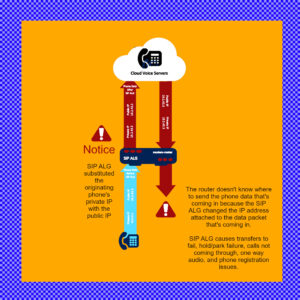SIP ALG: Why Turn It Off

However, the implementation of SIP in many network devices, such as firewalls, routers, and Network Address Translation (NAT) devices, frequently shows negative impacts on the performance and reliability of SIP-based communication systems. These issues were why technicians invented the SIP ALG (Application Layer Gateway).
SIP ALG features in many network devices. VoIP specialists designed it hoping to improve the functionality of SIP-based communication systems. This software gateway works by modifying SIP packets as they pass through the device. It addresses the issues that arise when SIP traffic traverses network address translation (NAT) boundaries.
SIP ALG started with the intention of improving the performance and reliability of SIP-based communication systems. In reality, it often causes more problems than it solves. To help our clients understand, we discuss why SIP ALG should be turned off in most cases.
Interference with SIP messages
SIP ALG interferes with the normal functioning of SIP messages, often causing serious problems. SIP ALG modifies SIP packets as they pass through the device. These modifications often cause incorrect or malformed SIP message translation on the other end.
For example, SIP ALG might alter the SIP headers in a way that causes the SIP message to trigger the recipient’s security protocols. This rejection by the recipient’s phone results in communication failure, dropped calls, and other issues that negatively impact call quality.
Additionally, SIP ALG often causes problems with SIP message routing. SIP messages are usually routed through multiple network devices. Each device may perform its own modifications to the SIP packets. These repeated changes result in the SIP messages becoming garbled and unintelligible, leading to communication failure.
Inconsistent Behavior
SIP ALG’s functionality often results in inconsistent behavior across different devices. This means that the same SIP message gets handled differently by different devices, leading to unpredictable results.
For example, if one device alters the SIP headers in a way acceptable to the recipient’s device, another device could modify the headers in a way that causes the message to be rejected. This inconsistency leads to confusion and frustration for users. Given that different devices cause the problems, system administrators suffer major headaches trying to diagnose and solve the core issue.
Lack of standardization
Various devices implement SIP ALG in wildly changing ways due to the lack of a standardized deployment. This lack of standardization leads to compatibility issues between devices. Incompatible devices make an IT technician’s life miserable when deploying SIP-based communication systems across multiple network devices. Miserable IT technicians make everyone miserable. Make sure the coffee stays stocked up?
Just to place the cherry on the sundae, lack of standardization makes it difficult for vendors to ensure that their products work correctly with other devices. This results in compatibility problems and often limits the choice of devices that can be used in a given deployment.
Security risks
Finally, SIP ALG often introduces security risks into a network. By modifying SIP packets as they pass through the device, SIP ALG exposes security vulnerabilities that malicious actors search for constantly.
For example, an attacker finds and exploits a vulnerability in the SIP ALG implementation to inject malicious code into SIP packets, compromising the security of the network. Additionally, SIP ALG frequently leaks sensitive information, such as IP addresses, by adding or altering information in the SIP headers. Malicious actors use this information to launch targeted attacks against specific devices or networks.
Furthermore, SIP ALG also opens up new attack vectors by altering SIP messages in unexpected ways. Unintended consequences allow malicious actors to bypass security measures, such as firewalls or intrusion detection systems.
Wrap Up
The lack of standardization, unpredictable behavior, and potential security risks associated with SIP ALG make it a problematic feature. Just turn it off. Instead, use alternative solutions, such as proper NAT configuration. Good configuration addresses issues that arise when SIP traffic traverses network address translation boundaries.
SIP ALG got written to improve the performance and reliability of SIP-based communication systems. Unfortunately, it often causes more problems than it solves. We came up with better ways since SIP ALG’s inception. It interferes with SIP messages, causes inconsistent behavior, lacks standardization, and introduces security risks. SIP ALG impacts the functionality and security of SIP-based communication systems on a broad scale. As a result, turning off SIP ALG in the vast majority of cases represents the wise course. Instead, use alternative solutions to address the issues that arise when SIP traffic traverses network address translation boundaries.
For a deeper dive, check out Intermedia’s article on SIP ALG.
Ready For A Top Notch VoIP Business System?
Want to never worry about any of this stuff? We can take care of it all for you.
Here at NoContractVoIP, we create custom business phone systems offering a full suite of hybrid and remote solutions for your telecom needs. We rely on your success and we know it.
We never lock our clients into long term contracts. If you dislike our services or support, just tell us to cancel and we take care of it. No early termination fees, nobody gets stuck for years on end, and we’re motivated to keep our clients thriving.
All of our tech support people live and work near our headquarters in California, and tech support always answers 24/7/365. Our billing and customer support work from the same office. When you call you get a human, not a menu.
To get the latest helpful content delivered to your inbox every month, subscribe to our newsletter here.
Looking for the finest stress-free custom business telephone systems? Contact us or call today at 866-550-0005!
